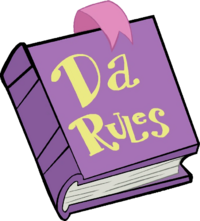Difference between revisions of "Moot"
Kevin Wang (talk | contribs) m |
Kevin Wang (talk | contribs) m |
||
| Line 5: | Line 5: | ||
Consider a scenario where a [[tossup]] is [[negged]] [[outside of power]] by team B and then picked up by team B [[conversion|for ten points]]. If team B then gets twenty points on the bonus, then there are 75 points "pending protest" - that is, depending on the outcome of the protest, there is the possibility of the score changing by up to 75 (team B would lose their 30 points and team A would get back 5 from the neg, receive 10 for answering correctly, and could potentially score 30 on the bonus). This scenario can also be described as "having a potential swing of 75 points". | Consider a scenario where a [[tossup]] is [[negged]] [[outside of power]] by team B and then picked up by team B [[conversion|for ten points]]. If team B then gets twenty points on the bonus, then there are 75 points "pending protest" - that is, depending on the outcome of the protest, there is the possibility of the score changing by up to 75 (team B would lose their 30 points and team A would get back 5 from the neg, receive 10 for answering correctly, and could potentially score 30 on the bonus). This scenario can also be described as "having a potential swing of 75 points". | ||
| − | If the final score of the round is team A 210 - team B 240, then the protest would have to be resolved to determine the final winner of the game. This is because a) the potential swing is in team A's favor and | + | If the final score of the round is team A 210 - team B 240, then the protest would have to be resolved to determine the final winner of the game. This is because a) team A is losing b) the potential swing is in team A's favor and c) the differential is less than 75 (the size of the swing). |
If the scores were reversed so that team A was in the lead, then the resolution of the protest could not win the game for team B and team A wins outright - the protest is moot. | If the scores were reversed so that team A was in the lead, then the resolution of the protest could not win the game for team B and team A wins outright - the protest is moot. | ||
Revision as of 17:24, 14 April 2024
Before the game
During the game
A protest (or series of protests) is moot if the potential change in score is not sufficient to change the outcome of the game. Protests that are invalidated in this way have been rendered moot (per standard American English).
Example
Consider a scenario where a tossup is negged outside of power by team B and then picked up by team B for ten points. If team B then gets twenty points on the bonus, then there are 75 points "pending protest" - that is, depending on the outcome of the protest, there is the possibility of the score changing by up to 75 (team B would lose their 30 points and team A would get back 5 from the neg, receive 10 for answering correctly, and could potentially score 30 on the bonus). This scenario can also be described as "having a potential swing of 75 points".
If the final score of the round is team A 210 - team B 240, then the protest would have to be resolved to determine the final winner of the game. This is because a) team A is losing b) the potential swing is in team A's favor and c) the differential is less than 75 (the size of the swing).
If the scores were reversed so that team A was in the lead, then the resolution of the protest could not win the game for team B and team A wins outright - the protest is moot.
In the UK
In the UK, the term "moot" is more frequently used with the meaning "to bring up for discussion;"[1] thus "mooting a protest" refers to the initial act of raising a protest rather than the final act of closing one.
